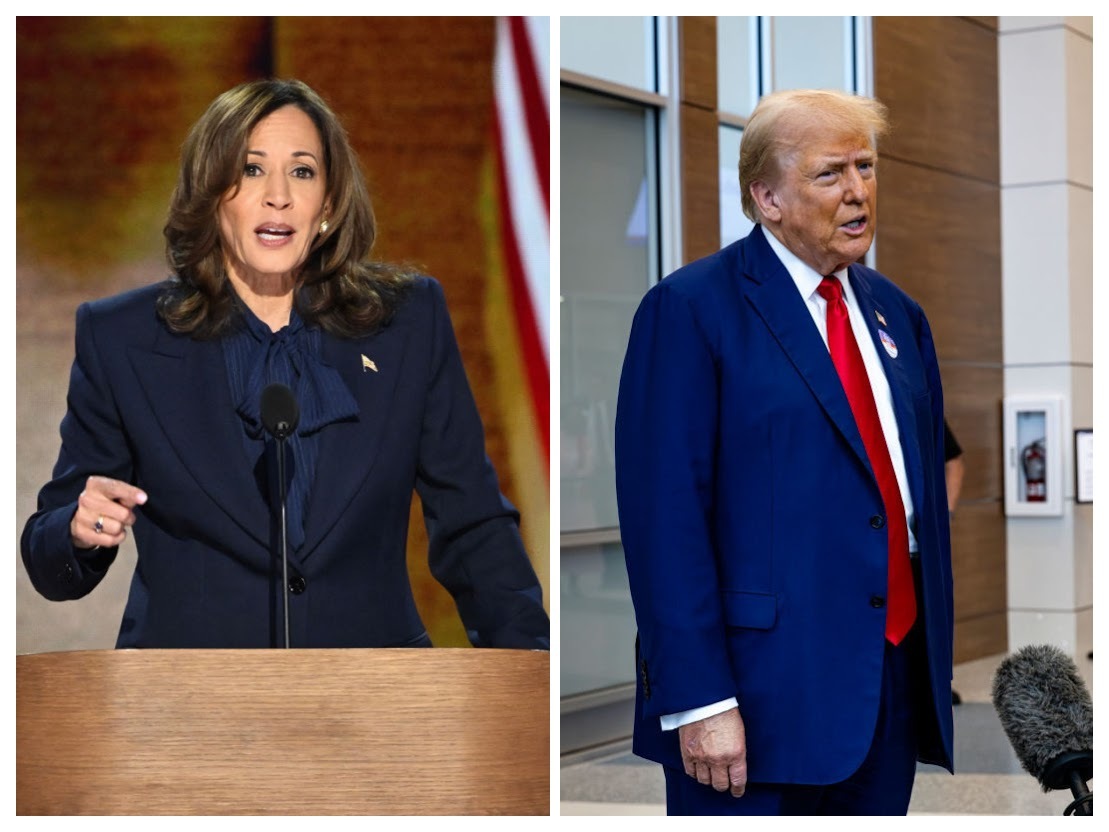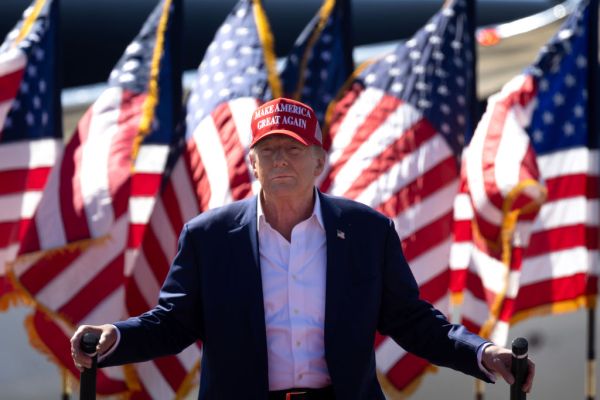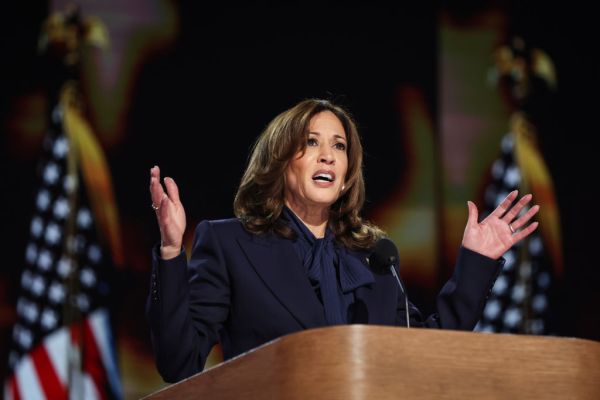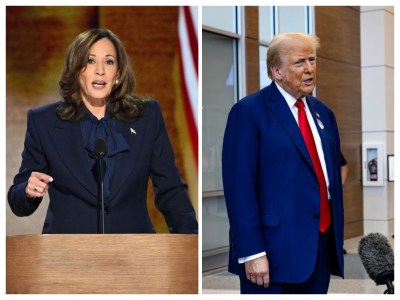Happy Tuesday! Election Day is 56 days away. Plus, it’s debate day in America, so it only feels appropriate to give our readers a hearty “Let’s get ready to rumblllllllle!”
Up to Speed
- Vice President Kamala Harris’ campaign has a new ad highlighting negative comments that former top officials in Donald Trump’s administration have made about the former president. The ad—which will run today on Fox News and in the Philadelphia and West Palm Beach (where Mar-a-Lago is located) media markets—features comments by former Vice President Mike Pence, former Secretary of Defense Mark Esper, former National Security Adviser John Bolton, and former chairman of the Joint Chiefs of Staff Gen. Mark Milley, all of whom have rebuked Trump either explicitly or implicitly.
- Harris’ campaign also appears to be trying to preempt attacks that Trump will likely level at her during the debate, highlighting a statement from 10 retired top military brass defending the Biden administration’s withdrawal from Afghanistan by placing the blame on a “chaotic approach” the Trump administration took in negotiating a deal with the Taliban. “[Trump] left President Biden and Vice President Harris with no plans to execute a withdrawal, and with little time to do so. This chaotic approach severely hindered the Biden-Harris Administration’s ability to execute the most orderly withdrawal possible and put our service members and our allies at risk,” reads the statement in part.
- But Trump will likely hit Harris for her shifting policy positions tonight, especially after the reemergence Monday of a questionnaire from the American Civil Liberties Union she filled out during her failed campaign for the 2020 Democratic nomination. In her responses, Harris had indicated her support for multiple left-wing policies, including government-funded sex-change surgeries for prisoners, ending migrant detention centers and private prisons, and decriminalizing all drug possession for personal use, CNN reported. When asked if Harris still held those views, an anonymous Harris campaign adviser told CNN that her positions “have been shaped by three years of effective governance as part of the Biden-Harris Administration.”
- Former independent presidential candidate Robert F. Kennedy Jr. will remain on the ballot in Michigan, the state’s Supreme Court ruled Monday. That decision reverses a ruling from the state’s appeals court after Kennedy tried to remove his name after he suspended his campaign and endorsed Trump. But Kennedy was successful in taking his name off the ballot in North Carolina, where the state Supreme Court ruled Monday it must be removed.
Our Take on What to Watch for Tonight

Tonight’s debate in Philadelphia will be the first, and perhaps only, one-on-one faceoff between Vice President Kamala Harris and former President Donald Trump. The last general-election debate was incredibly significant, with Joe Biden’s abysmal June 27 performance in Atlanta leading directly to the president’s withdrawal from the race 24 days later.
Could anything in the ABC News debate have the same magnitude? Or even have any sort of real impact on the outcome of the race? We asked some of our colleagues around The Dispatch watercooler to share their thoughts in a special Dispatch Politics symposium on this question: What would make this debate consequential?
David M. Drucker: Kamala Harris has a rare opportunity toward the end of what by now would have normally been a grueling 18-month White House campaign: to make a favorable first impression.
That was evident in the fresh, high-quality poll from the New York Times and Siena College that showed Donald Trump edging the vice president 48 percent to 47 percent, with 28 percent of likely voters saying “they felt they needed to know more about the Democratic nominee” and only 9 percent saying the same about the former president.
If Harris can make a favorable impression, her first debate ever as a presidential nominee will be successful. With the election poised to swing by a mere tens of thousands of votes or less in one battleground state or another, such an impression could deliver her the White House. As for Trump, this evening marks his seventh debate as a Republican nominee. By the numbers, he has more experience at this than any general election candidate in the modern era.
But here’s the secret—except for the last debate in June, in which President Joe Biden was so bad it led to his exiting the race in favor of Harris, Trump has generally been mediocre in these situations versus Democrats. In 2020, voters found Trump’s combative style so insufferable, he never recovered. So for Trump, success equals pretending to be someone he’s not for just 90 minutes.
In other words: He needs to be empathetic, gracious, measured—accepting that he was fairly and legitimately ousted by Biden four years ago. In doing so, that small sliver of persuadable and truly undecided voters left might imagine a second four years of Trump’s policies, rather than Trump’s personality, and give him another chance to lead.
Steve Hayes: The debate can matter in two ways, one more obvious than the other.
For Kamala Harris, there’s a real downside to avoiding the media: It increases the scrutiny on those rare times that she puts herself out there, like this debate. Harris has largely abandoned the progressive she was in 2019 while running for the Democratic nomination for president. Can she explain why she no longer holds so many of the positions she ran on just five years ago? And as she gives those explanations, can she avoid the kinds of meandering answers that sound like Greg Focker’s prayer in Meet the Parents?
For Donald Trump, I don’t buy the argument that the Republican nominee has fundamentally changed since he was first elected, but his rally rhetoric, social media posts, and answers to interview questions suggest that he’s become far more illiberal and radical. It’s true that pretty much everyone has an opinion about Trump, but most people don’t watch his rallies and don't see this more unhinged Trump. If that’s who he is on the debate stage, could it spook some small slice of the small group of voters who remain undecided?
Sarah Isgur: Remember that only two things can affect an election: motivating someone to vote who was otherwise not going to vote or persuading someone to switch their vote.
It’s worth remembering that Donald Trump was up by 1.5 points in the Real Clear Politics polling average on the day of his June debate with Joe Biden, and the biggest polling spread came 11 days later when Trump was up by: 3.4 points. That’s it! A less-than-2-point swing as a result of the most catastrophic debate performance in presidential history. That’s how many people are actually up for grabs based on a debate performance!
So which type of voter is a debate likely to affect? The low-propensity voters—the people who are unlikely to vote in the first place—probably aren’t watching. If they are affected by the debate, it will be through social media clips that circulate in the days that follow and drip through the media cracks in their world. Persuadable voters come in many different colors, but it’s definitely the case that some will be watching the debate in real time. But if they’re truly undecided at this point, what additional information is going to move them? It’s probably not the same things that will stand out to a high-information, high-propensity voter. For the sliver of people up for grabs, vibes can matter a lot.
I’ll be more interested if the debate solidifies pre-existing narratives that may lock in some of these more volatile swing voters—Harris is too liberal, Trump is erratic, Harris is a policy lightweight, Trump is weird. The election looks like a toss-up today, but under the surface there’s been a lot of volatility. Will anything at the debate stabilize voters and lock in “the vibes” as early voting is about to start?
Michael Warren: The collective reaction to Joe Biden’s performance in the June debate was shock. It was stunning for Americans who, for an uninterrupted 90 minutes, saw Biden just as others later revealed he was behind the scenes: elderly, stumbly, and probably not up for the job of running for reelection. The surprise upended the entire race.
Something shocking would need to happen again for tonight’s debate to have a meaningful impact on this exceedingly close election. Donald Trump tripping as he walks onstage or Kamala Harris vomiting on the podium might do it, but a more reasonable expectation would be that one of the two candidates could shock us in what they say.
Trump could fail to contain his anger and say something particularly harsh or uncouth about Harris, betraying the apparent contempt he has for his rival’s intelligence or appearing misogynistic or racist. There is still a capacity for Trump to offend, and anything that triggers swing voters’ memories of the “bad,” chaotic former president could hurt.
Harris, meanwhile, is one tin-eared comment away from demolishing her campaign’s carefully crafted effort to remake her from a California progressive to a joyful, patriotic liberal. If she says something awkward and offensive, like “basket of deplorables,” it might be all Trump needs to make an effective ad to run for the rest of the fall.
Eyes on the Trail
- It’s a quiet day on the presidential trail, with Trump getting into Philadelphia shortly before the debate begins at 9 p.m. ET. Harris arrived in Philadelphia last night from her debate-prep retreat in Pittsburgh.
- A reminder that Gov. Tim Walz will be watching the debate in Arizona, where he has “multiple political engagements” in the afternoon and a speech at a political event early in the evening. Sen. J.D. Vance, meanwhile, will be in Philadelphia to watch the debate and plans on appearing in the post-debate spin room to speak with reporters.
- We covered the post-debate campaign schedule for both Harris and Walz in yesterday’s newsletter, but we now have info on where Trump is heading after Philadelphia: west. The Republican nominee will hold a rally focused on the economy and the cost of housing on Thursday in Tucson, Arizona. Trump will travel next door to California, where he will hold a press conference on Friday morning at his golf course near Los Angeles. (Though it’s worth noting the last few “press conferences” Trump has held have actually been extended monologues with little to no questioning from independent reporters.)
Notable and Quotable
“Philly is wit Kamala Harris”
—Billboards and signs Vice President Kamala Harris’ campaign has placed in Philadelphia ahead of the debate, playing off the local lingo for ordering a cheesesteak “wit” onions, September 9, 2024










Please note that we at The Dispatch hold ourselves, our work, and our commenters to a higher standard than other places on the internet. We welcome comments that foster genuine debate or discussion—including comments critical of us or our work—but responses that include ad hominem attacks on fellow Dispatch members or are intended to stoke fear and anger may be moderated.
With your membership, you only have the ability to comment on The Morning Dispatch articles. Consider upgrading to join the conversation everywhere.